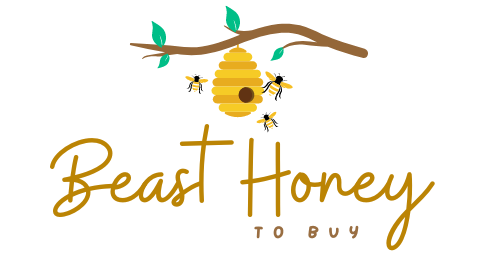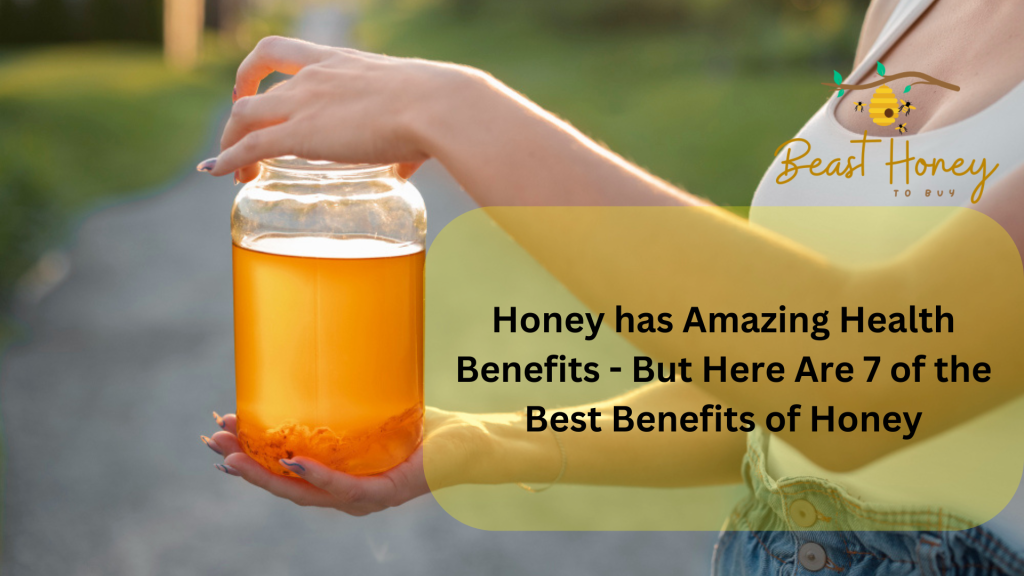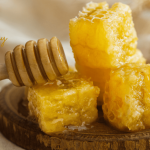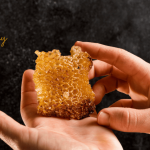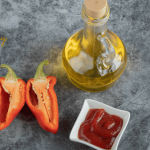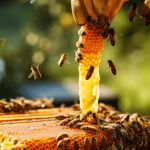The summer months are the most popular time for harvesting beehives, but the goodness of honey can indulge in throughout the other seasons as well.
In this honey blog, we’ll discuss exactly how honey bees produce the magical golden liquid that we all know and love, how its chemical makeup contributes to the amazing beneficial properties that honey has, different ways that we can benefit from those properties, and more – including ANSWERS to popular questions like, “is honey vegan?” Does honey go bad, and why does honey crystallize? Read on to find out!
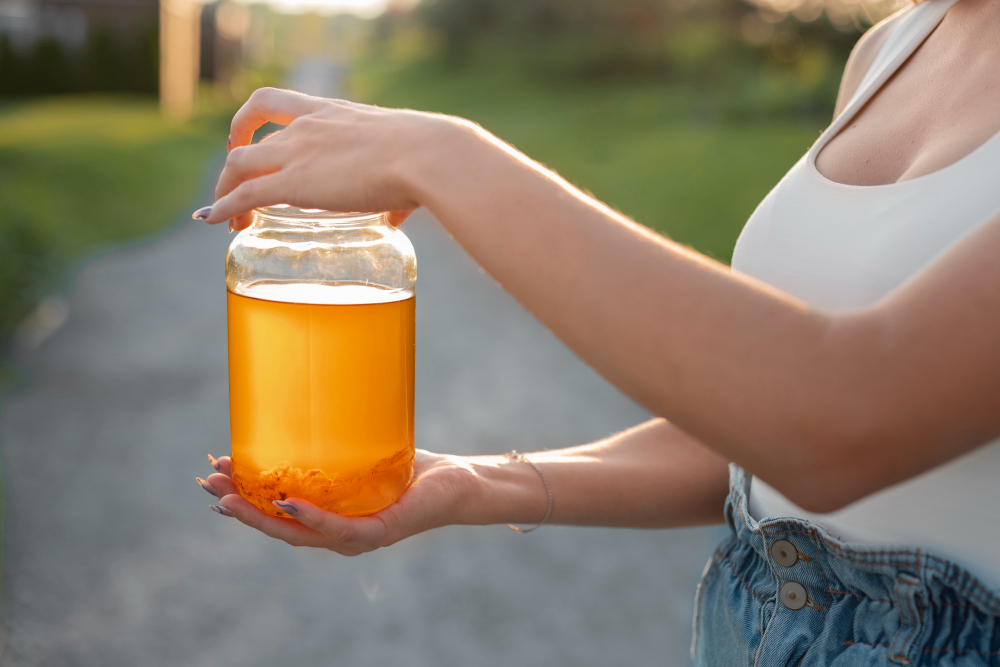
What is Honey?
Honey is the thick, sweet, golden liquid produced by bees that humans have harvested for thousands of years.
The earliest evidence we have of humans collecting honey is a Neolithic cave painting in Valencia, Spain – it shows a man on a ladder, one hand in a hive and the other holding a smoking branch to placate the bees swirling around his head and chest.
Beekeeping was an alien concept then, 15,000 years ago. He and his community would put their health – and lives – on the line to swipe honey from the hives of wild bees.
Throughout history, honey has been consumed and utilized in countless ways. The ancient Egyptians sweetened foods and drinks with honey, used it to treat wounds, paid taxes with it, preserved meat and fruit in it, even embalmed the dead with it. Honey was a subject of scientific study in ancient Greece, and a medicine and cure-all for many ills.
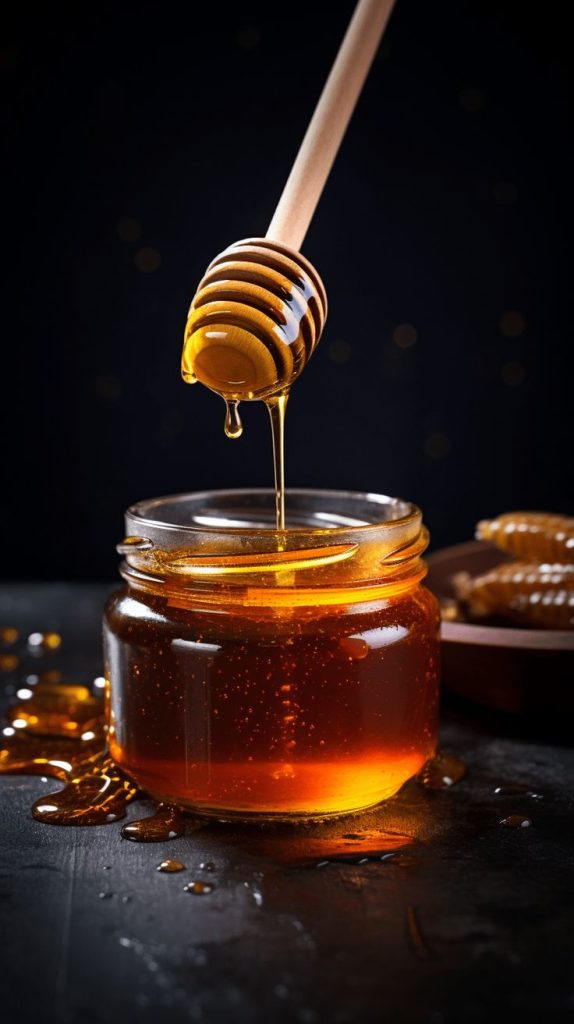
How Do Bees Make Honey?
Honey starts out as nectar, the sugary fluid flowers produce so that pollinators will visit them. Nectar is composed of about 70 to 80% water, combined with three types of sugar; sucrose, glucoses, and fructose.
Honey bees, for example, use their hollow proboscis (tongue) like a straw to draw the nectar into their honey crop. A special stomach, known as the proventriculus.
Invertase, an enzyme the the bees secrete in their salivary glands, digests sucrose into glucose and fructose – the simpler sugar molecules. There are several other enzymes in the honey crop, such as glucose oxidase, which converts the glucose into gluconic acid and hydrogen peroxide.
Once back in the hive, the forager transfers her nectar via her mouth to a different worker bee. Through a process called trophallaxis, the nectar is shared from bee to bee in order to reduce its water content. When the water content is about 20 percent, the bees will store it in cells of honeycomb; at that level, it’s nearly honey. It is still somewhat too wet, so the bees further dry it by fanning it with their wings. Once it is ready, they close the cell with a wax lid to keep it clean and fresh. This ultimate substance is the honey we all know and love!
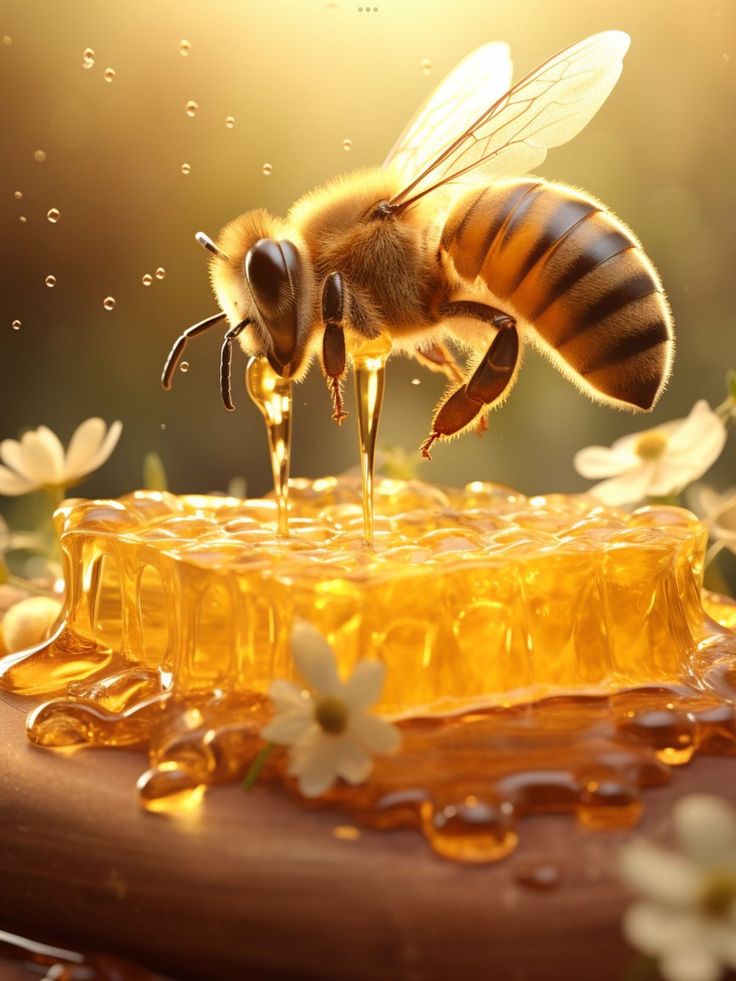
Is Honey Good For You?
Honey Health Benefits at a Glance:
- Its high content of vitamins and nutrients
- Has a lower glycemic index compared to white sugar
- High levels of antioxidants
- Antimicrobial & antibacterial, anti-inflammatory
- Stimulates growth and restoration of cells
- Natural antiseptic
- Humectant and emollient-properties

Benefits of Honey As Food
Before speaking about the good traits of honey, we feel that we must be talking about how too much focusing on whether a food is “good” or “bad” for your health, is a bad thing. There is no inherent moral value to food, and cutting out all the so-called “bad” foods will contribute to a poor relationship with food altogether.
A few things to keep in mind: one, raw honey is actually more nutrient and vitamin dense than white sugar (as raw honey contains vitamins and minerals such as potassium, calcium, zinc, vitamin B, vitamin C, electrolytes, enzymes, amino acids and flavonoids). These micronutrients have a ton of health benefits, including neurological functioning, muscle repair, healthy bone growth, and more.
Honey, with 40 percent fructose to 30 percent glucose, is metabolized more slowly than table sugar; it has a lower glycemic index. This helps prevent the rapid blood sugar increase and drop that refined sugar produces.
Fructose is also sweeter than glucose, which also means that honey is sweeter than sugar – you probably will need less honey to achieve the same effect as using more sugar.
Raw honey is high in antioxidants, compounds that protect the body from cell damage due to free radicals. Chronic and degenerative diseases, including cancer, rheumatoid arthritis, cardiovascular disease, and neurodegenerative diseases, are partly the result of the accumulation of free radicals in the body.
Since there is some evidence that taking high dosages of antioxidant supplements may have the opposite effect to what they hope for, it is far better to ensure you have an antioxidant rich diet consisting (ideally) of most fruits and vegetables (the pigment provides most of the antioxidants) and honey.
Honey, being naturally antibacterial, antimicrobial and anti-inflammatory, can thus help prevent the spread of viral and bacterial infection throughout your body and thus keeping your cardiovascular health, metabolic function, digestion, nervous system and skin in good shape.
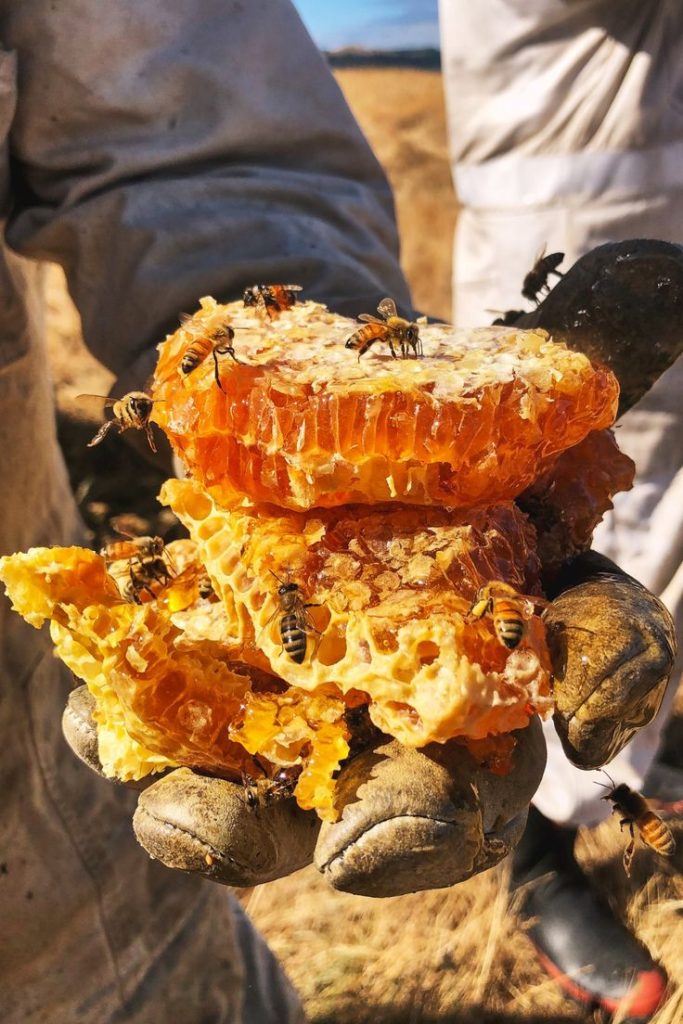
Medicinal use of honey: Here are the advantages
Honey for medical treatment has been utilized since the Antiquity period. Hippocrates, the classical Greek philosopher widely regarded as the ‘father of modern medicine’, recognized the benefits of honey and used it in a number of different formulations to combat a wide range of illnesses, injuries and other health concerns.
According to ancient Indian Vedic civilization which gave birth to an almost natural system of medicine “Ayurveda”, “Madhu”, honey, is a precious of the natures gift to human beings and used to treat multiple diseases. Honey was used in ancient Chinese, Roman and Assyrian medicine to treat wounds to the flesh and gut diseases, among other applications.
Experimental and clinical studies over the last few decades have put honey’s powers to the test, generating remarkable results that secure its role in contemporary healthcare. It has been reported that honey inhibited a wide range of bacteria (∼60 bacteria species; some fungi and virus species).
The antioxidant property of honey play crucial role in treat and prevention of different degenerative diseases.
Honey is also anti-inflammatory, antibacterial and antimicrobial. It shows promise for treating sore throats and fighting viruses, bacteria and fungi.
A study in 2017 confirmed honey’s role in the recovery from gastroenteritis, and other studies have recognized it for ulcers and gastritis as well. It is also a natural antiseptic, and may help prevent infection in cuts, burns and other wounds – it has even been said to quicken healing.
The first written reference to honey, the Sumerian tablet from the years 2100–2000 BC, describes honey’s use as a drug and ointment.
One of honey’s benefits is an excellent wound treatment – it prevents bacterial growth, it promotes rapid healing allowing to keep a moist wound environment, and it also has a high viscosity, helping provide a barrier needing protection from infection.
Honey-dressed open wounds have much quicker healing and faster preparedness for closure by stitches compared with those dressed conventionally on clinical observations. But what is it that makes honey have so many benefits?
Honey is self-preserving because of its chemical properties. Honey is a supersaturated solution consisting of approximately 80% sugar and 20% water. There is so little water that it is inhospitable to bacteria and mold. Honey’s also extremely viscous, which prevents oxygen from reaching die wanting the stuff—bacteria needs oxygen to survive.
As we already discussed, the glucose oxidase enzyme in the honey crop of bees increases the acidity of honey. The average pH of honey is between 3 and 4.5, and that level of acidity will wipe out anything that would want to grow there – like bacteria, viruses and fungi. Another byproduct of the enzyme glucose oxidase is hydrogen peroxide, which offers another line of defense against infection.
Honey, like all sugars, is also hygroscopic, meaning that it’s able to absorb excess moisture from the environment and consequently dehydrate bacteria.
Honey is hypertonic —a much higher concentration of sugar compared to the interior of bacterial cells which causes the bacterial cells to dry out, expelling all the water from the cytoplasm. This phenomenon is known as plasmolysis, and it kills the bacteria, along with the hygroscopic properties of honey.
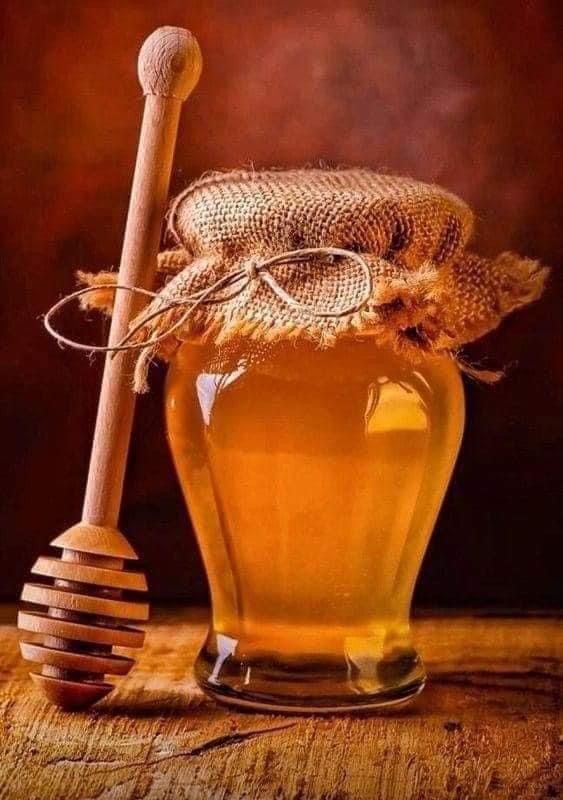
Topical Benefits of Honey
But wait, there is more honey benefits! Apart from its numerous health and medicinal benefits, honey and other bee products are commonly used in the formulation of skincare, haircare, and cosmetic products.
Honey is a natural humectant, thanks to that hygroscopic (water-absorbing) quality we mentioned above. A humectant is a substance that encourages the retention of moisture. Honey is also an emollient, meaning that it softens and soothes skin.
When incorporated into hair products, honey pulls water molecules out of the air and pulls them into the hair follicles and the scalp, hydrating and nourishing along the way.
Honey’s anti-fungal properties mean that it can also be used to treat seborrheic dermatitis and dandruff; its anti-inflammatory properties help to heal redness and itching on the scalp.
Honey also helps to accelerate healing by promoting cellular growth – this property can be used to make effective hair growth products, as well as skin products that hide and heal acne marks.
As we discussed earlier, honey is also packed with vitamins, minerals, amino acids and antioxidants. These nutrients literally protect both the hair and the skin against damage and make your hair, skin much healthier.
Honey is rich in antioxidants, which is why it is a natural anti-aging compound – it prevents wrinkles and keeps the skin youthful and with an even texture.
Skin cosmetics make use of the advantages of honey by using its emollient and humectant properties. Not only does it moisturize and soften skin, but it has antimicrobial and antibacterial properties, which can reduce bacteria that trigger eczema and acne.
The Top 10 Benefits of Honey for the Skin & Hair
As a humectant and emollient, honey is hydrating, nourishing, and moisture-retaining.
As a natural anti-aging compound, honey prevents wrinkling and gives skin a youthful glow due to its high level of antioxidants.
It also supports cellular growth, making it great for hair growth and acne scar healing.
Thanks to its antimicrobial and antibacterial properties, it reduces the bacterial load responsible for eczema and acne.
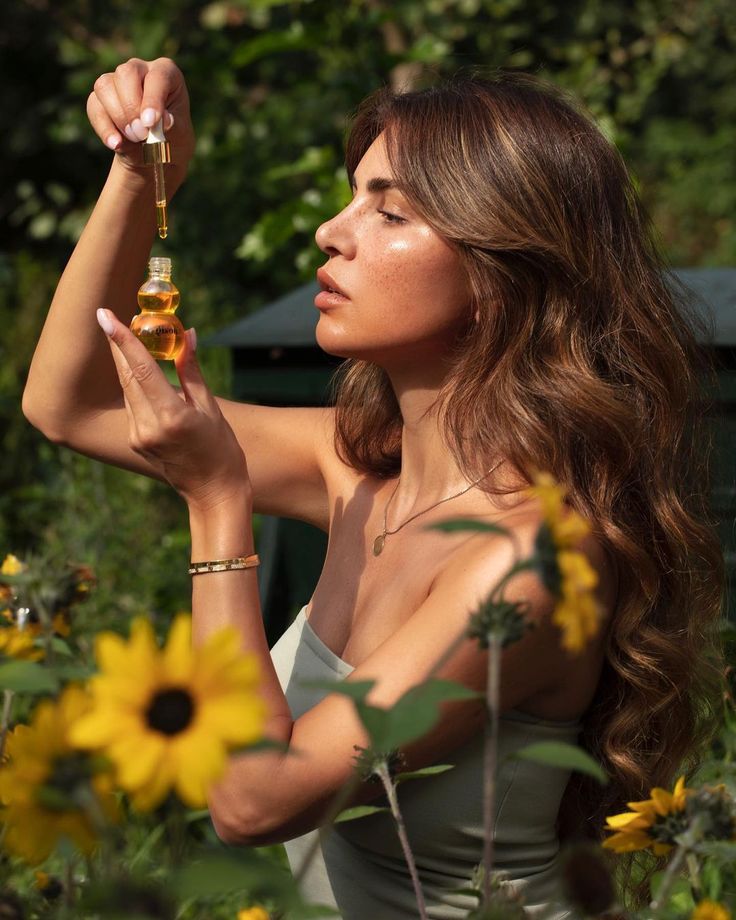
Does Honey Go Bad?
Honey never goes bad if stored correctly. Scientists discovered honey 3,000 years later that was still edible, in sealed pots, in the tomb of the Ancient Egyptian pharaoh, King Tut. That’s thanks to many of the same reasons honey is good for us – honey’s antibacterial, antimicrobial and acidic qualities keep it from turning bad.
If you add water to honey it will ferment, the end. Honey is hygroscopic, so it’ll start to draw in moisture from the air if it’s not covered up. If the water content gets high enough, the yeast can ferment the honey and produce alcohol.
And this is also how mead was made! Mead was the first ever alcoholic drink – traces of the honey-based beverage oxygen were located in 9,000-year-old ceramic pottery jars found within the Neolithic settlement of Jiahu, in Henan province, Northern China.
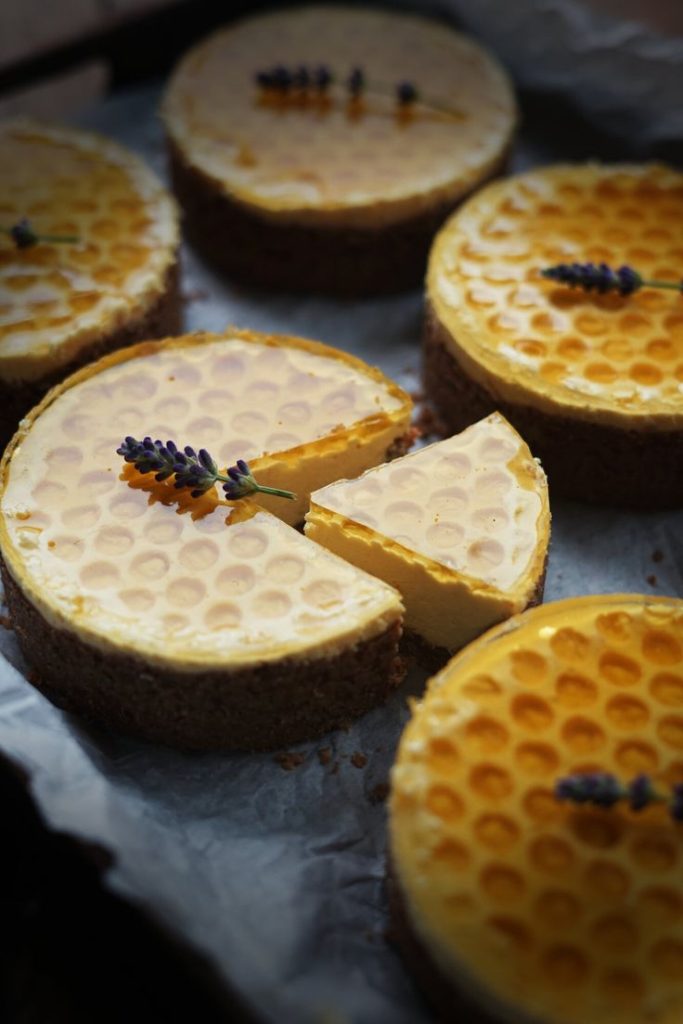
Why Does Honey Crystallize?
Sometimes people think their honey has gone bad when it crystallizes. Honey is roughly 80% sugar and 20% water. What happens, over time, is the excessive sugars will crystallize to bring that sugar and water ratio into balance.
In other words, there is not enough water in honey to keep all the sugars dissolved indefinitely; it will eventually become thicker and crystallize.
Now, not all honey crystals at the same rate, or in the same way. Based on other experiments, these three conditions will determine how much crystallization occurs:
The Type of Sugars
The two main sugars in honey are glucose and fructose – glucose has less solubility than fructose, so honeys that are higher in glucose will crystallize more quickly.
Temperature
Honey will crystallize in the hive if the temperature drops below 50ºF (10ºC), and honey will crystallize in your containers if you have a cold cupboard cabinet.
But keeping it too hot can lead to a degradation of the flavors and the health benefits. The best storage for honey? Keep out of direct sunlight, at room temperature.
Catalyst
Raw, unprocessed honey will contain microscopic bits of pollen, beeswax, and propolis – that’s where honey’s unique benefits lie! It’s also what provides a nucleus for sugar to crystallize around. Pasteurized honey lacks all that good stuff (it’s basically just sugar syrup), so it won’t crystallize.
Honey that have crystallized is definitely still safe to eat! Some individuals actually do enjoy crystallized honey, as it provides an alternate texture!
To undo the crystallization, all you need to do is put the jar of honey into a pot of hot – but not boiling – water; the warm heat will cause the sugars to redissolve.
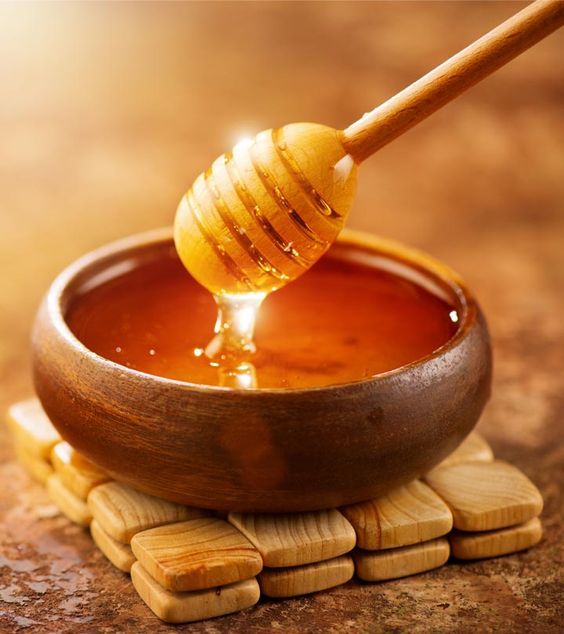
Manuka Honey Benefits
The highest definition of antibiotic and antiviral properties is said to be ‘Manuka’ honey, produced from the bush of the same name, that grows profusely in New Zealand. It turned out that these antimicrobial properties were directly correlated to the amount of a dietary chemical in Manuka called Methylglyoxal, or MG for short.
Rising numbers of drug-resistant microbial species have raised red flags to the urgent need for alternative and more effective antibacterial agents. Honey is very unique such that it doesn’t appear to make bacteria resistant like many conventional antibiotics, so the beneficial effects of honey can potentially be used indefinitely.
Manuka honey has been found to have antimicrobial activity toward pathogenic bacteria, including Staphylococcus aureus, which is the most common wound pathogen, Helicobacter pylori, which causes gastritis, and Escherichia coli, which causes urinary tract infections. One study showed that manuka honey actually treated gingivitis, plaque, and halitosis (aka bad breath).
Manuka honey is a type of monofloral honey with consistently high antimicrobial, antiviral, and anti-inflammatory activity, with particular efficacy in healing wounds, infections, and treating diseases.
Is Honey Vegan?
As defined by the Vegan Society, “Veganism is a way of living which seeks to exclude, as far as is possible and practicable, all forms of exploitation of, and cruelty to, animals for food, clothing or any other purpose.” Whether honey is or isn’t vegan is a topic that has been discussed for years.
For one, honey really is an animal product, and yes, honey bees are exploited for migratory beekeeping which does, in fact, commercialize their pollination services. Ethical beekeeping is when beekeepers only take honey from hives that have an excess of supply and always leave more than enough for the bees.
The Best Bees Company follows these practices, and most beekeepers around the globe do too. Commercialized beekeeping, though, generally puts profit ahead of the bees’ health, and will rob the bees of their honey and refill the hives with sugar water or high fructose corn syrup – sub-optimal food sources.
Other inhumane practices are wing clipping of queen bees to discourage them from abandoning their hive, which would be a loss in productivity and subsequently it’s a loss in profit.
A third is the selective breeding of commercial honey bees so they will produce more honey. This has been viewed as a way to be both exploitative and cruel, given that breeding dogs with a reduced gene pool is likely to increase the chance of disease.
Then again, the vegans who refuse to eat honey because bees are being exploited by commercial beekeeping also risk going down a very slippery slope. Bees produce one-third of the crops in the United States; without migratory beekeeping, many vegan staple foods wouldn’t be available.
If someone is avoiding honey because it is produced with the exploitation of bees, then shouldn’t they avoid avocados, almonds, apples and other fruits and vegetables that are produced on the backs of migratory beekeeping?
And PETA senior media liaison, Catie Cryar, had an answer to this conundrum, one she provided to The Washington Post.
It’s hard to avoid fruits and vegetables that have been created with migratory beekeeping, Cryar said, but “everyone can easily avoid honey – a product made for bees, by bees – and enjoy vegan alternatives, like agave nectar.”
Cryar also added that veganism “isn’t about following rigid dogma for dogma’s sake but making kind choices that create positive change.”
In our view, you should not avoid honey, but use your power as a consumer to encourage ethical beekeeping practices. Support your local beekeepers by buying honey, or even get your own beees and produce your own honey!
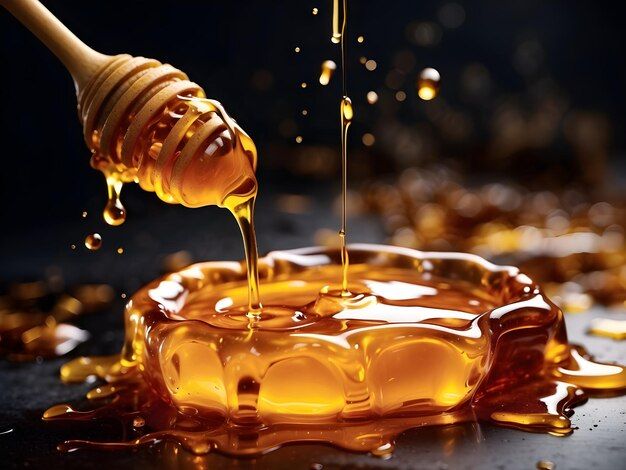
FAQs
Q: What is manuka honey?
A: Manuka honey is monofloral, meaning it is composed primarily of nectar harvested from the same flowering plant, in this case the Manuka bush, native to New Zealand, that has consistently high levels of antimicrobial, antiviral and anti-inflammatory activity
Q: Is honey good for you?
A: Yes – honey has numerous health benefits that can be accessed with the food itself as well as on hair and skin when used topically.
Q: Is honey vegan?
A: Because it is an animal product, in theory, yes. But if the honey is extracted from the hive without harming the bees through ethical beekeeping methods (which unfortunately, despite being controversial, some beekeepers do practice) the honey is not exploitative or harmful to the bee, thus technically vegan.
Q: Does honey help a sore throat?
A: Yes – the anti-inflammatory properties of honey help soothe the irritation and the antimicrobial properties help fight bacteria and viruses that cause sore throats.
